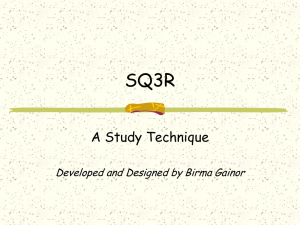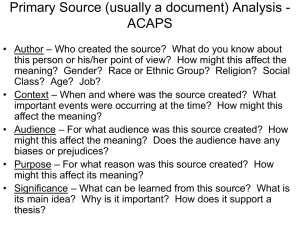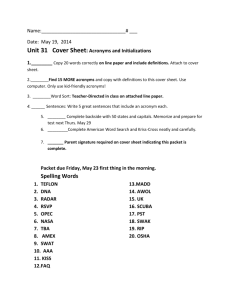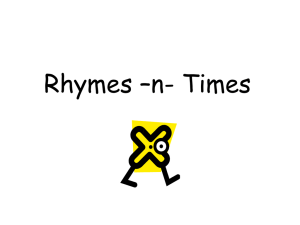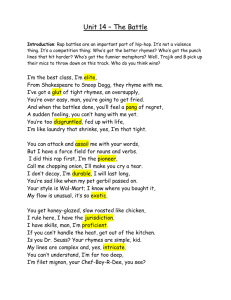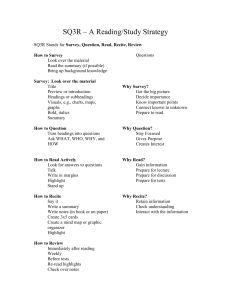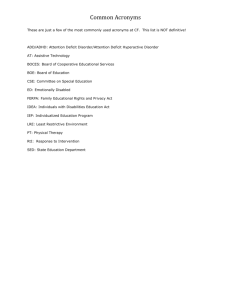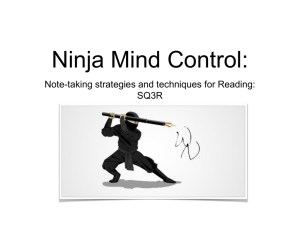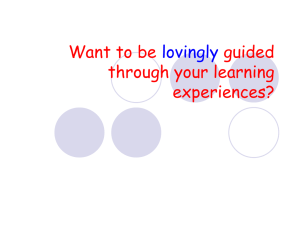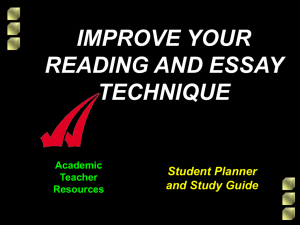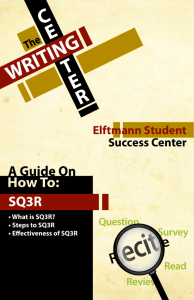Study Strategies and Critical Thinking Skills PowerPoint
advertisement
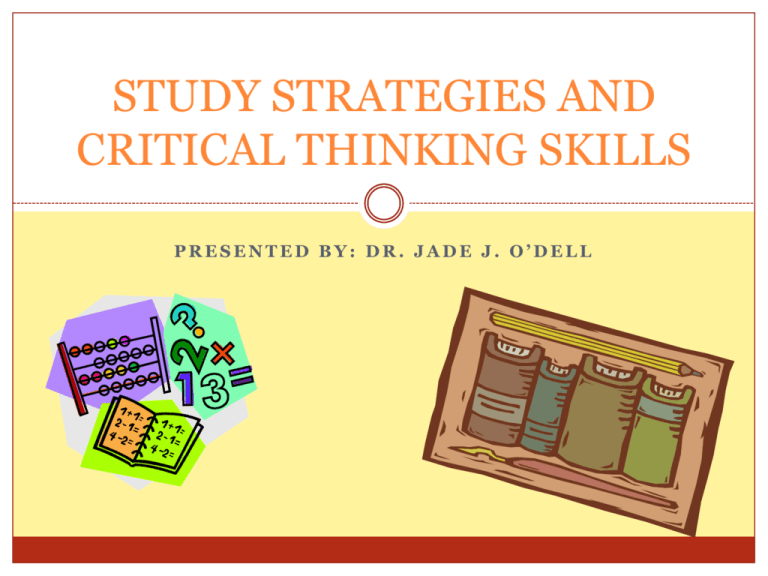
STUDY STRATEGIES AND CRITICAL THINKING SKILLS PRESENTED BY: DR. JADE J. O’DELL HMMM….PLEASE TELL ME… WHAT DOES STUDYING HAVE TO DO WITH THINKING? Critical thinking means…. Thinking about thinking Searching Making associations (former knowledge) Explaining Analyzing - Looking for options Problem solving Thinking “outside the box” & thinking about something from many angles In the classroom, critical thinking involves: Restraining emotion (allows objectivity) Looking at things differently (thinking beyond the obvious) Analyzing information (break it down!) Asking questions (promotes knowledge, helps solve problems) Problem solving (identify it, narrow it, look for and develop alternatives) Fact vs. opinion (can it be proven?) Seeking truth (where is it?) SO AGAIN, I ASK…. WHAT DOES STUDYING HAVE TO DO WITH THINKING? STUDYING involves THINKING (lots of it!)! ***Allow yourself to ENJOY the process of thinking and learning TO STUDY WELL, YOU MUST CONSIDER: ENVIORNMENT INFORMATION EXPECTATIONS (OF SELF, TEACHER, CLASS) MEMORY – your brain is like a funnel of information….you must learn how to organize and filter it! SHORT TERM MEMORY VS. LONG TERM MEMORY Sort term memory, a.k.a. working memory: holds a limited amount of info Long term memory: holds lots of info, like a flash drive; takes effort to store info into long term memory; consists of info you’ve been hearing over and over Must review info within 36-48 hours of hearing/learning it in order to store it into your longterm memory, review class notes/material within this amount of time! How do you remember information? VCR3 Visualize Concentrate Relate (make associations/ critically think) Repeat Review Memory Helpers and Hindrances Helpers Hindrances Proper sleep Distractions Proper diet Alcohol Physical Exercise Drugs Mental Exercise Positivity Environment Study breaks Repetition/visualization Stress Close-mindedness Inability to distinguish important facts from unimportant facts TRUE OR FALSE? “TO KNOW IT IS TO MEMORIZE IT!” “TO LEARN IT IS TO KNOW IT!” (When you know it, you can study it and remember it!) Three Useful Study Strategies: 1. SQ3R 1. SQ3R: Scan, Question, Read (& annotate), Recite, Review Works best with scanning and reading textbooks 2. MNEMONICS Works best to study lecture notes and textbook notes Examples of mnemonics: Jingles/rhymes Sentences Words Storylines Acronyms Sentences/Rhymes/Words/Acronyms Sentences: create a sentence with the first letter of each work of list of things you need to remember…think about the planets… My Very Elderly Mother Just Sat Up Nights Mercury, Venus, Earth, Mars, Jupiter, Saturn, Uranus, Neptune Jingles/Rhymes: think of commercials, songs…use information you need to study and apply to the beat of your favorite song – ABCs Words – think of remembering the great Lakes: HOMES = Huron, Ontario, Michigan, Erie, Superior Acronyms: First letter of each word and form a word: FANBOYS – For, And, Nor, But, Or Yet, So 3. Cooperative Learning Cooperative Learning is collaborative and group learning… A study group has the following: 5-7 people People who take notes People who ask questions People who will work diligently People who are doing well in the class In a Group, You Must… Develop “rules” for the group & pick a leader Ask questions Compare & share notes/ideas/understandings Drill and test each other Make predictions together Brainstorm If someone in the group is NOT following the rules of the group, they must go! When You Don’t Have Time…. Don’t blame your teacher Read quickly (remember SQ3R): Headings, highlighted info, introduction, conclusion, first & last sentence of each paragraph Make connections (think critically) Use study guides, old tests & quizzes VISUALIZE IT REPEAT, REPEAT, REPEAT!!! Choose info wisely – cramming means choosing what you think is most important – YOU CANNOT REMEMBER EVERYTHING WHEN YOU PROCRASTINATE! SUMMARY Learn it, don’t try to memorize – it’s impossible! Focus on the prize Think about what YOU want out of your class Don’t wait….review every day & when it is time for the test, you will not have to study, you will simply re-review! THINK as you study…it will help you better understand & remember Questions? Questions? Comments? What can you add to this presentation? Study tactics that work for you? Jade J. O’Dell, PhD. 504-278-6297, jadejudith80@gmail.com Office – 2nd floor of library
